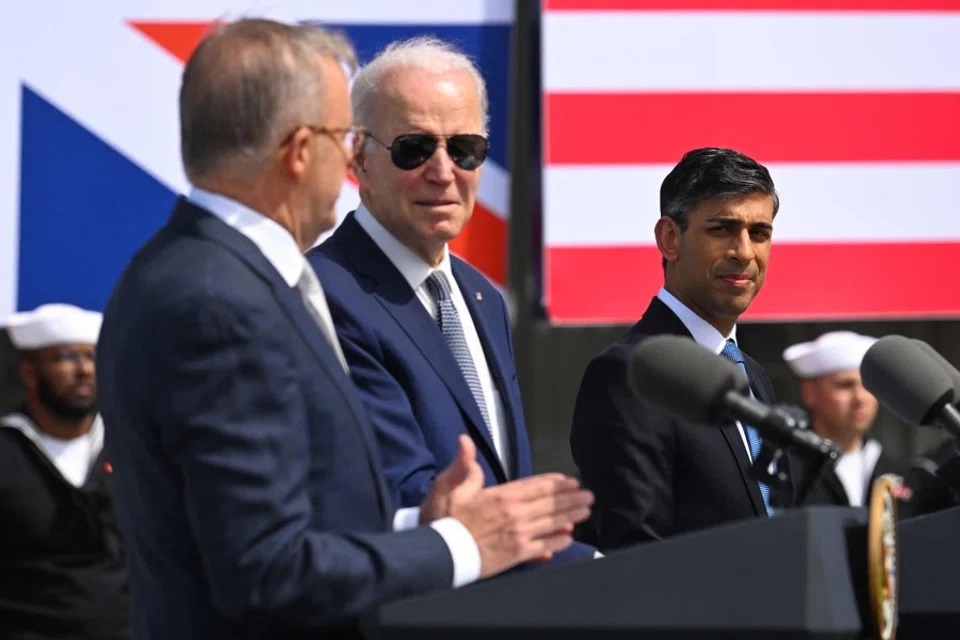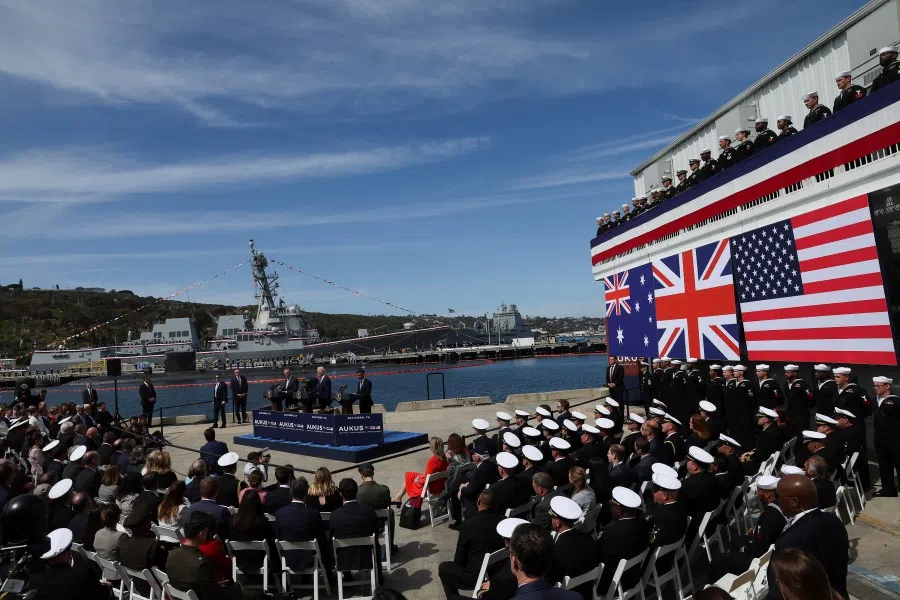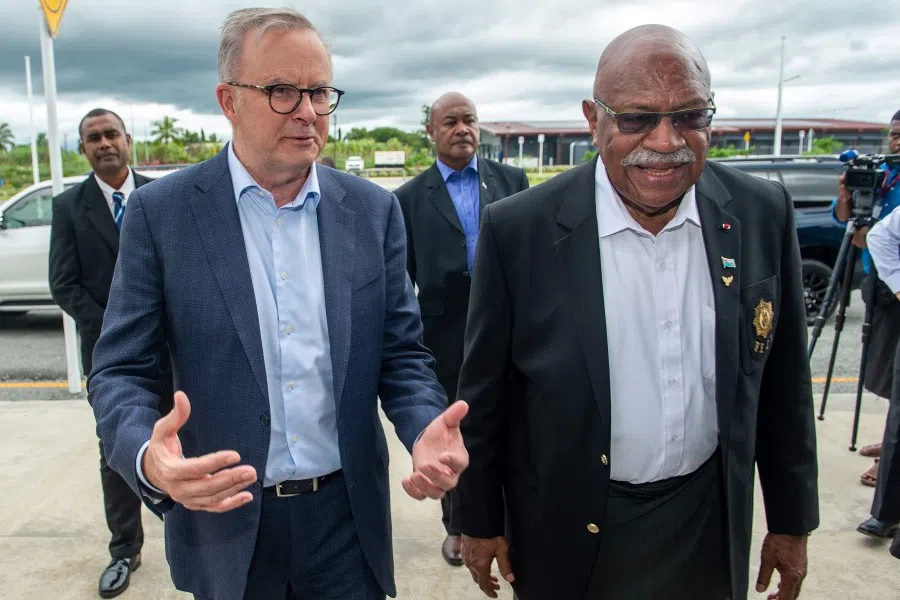If at first you don't succeed: Australia woos the Indo-Pacific on AUKUS
Australia made extensive diplomatic overtures to Asia prior to its March update about the AUKUS nuclear-powered submarine arrangement with the UK and the US, note researchers Blake Herzinger and Alice Nason. Canberra appears to have gained some traction in the region, but it should not rest on its laurels.

When Australia announced its trilateral security partnership with the UK and the US in September 2021, the response from the Indo-Pacific (in particular, from Southeast Asia) was tumultuous. It is no surprise, then, that in the run-up to the March update on its chosen AUKUS submarine pathway, Canberra was careful to preclude another public spectacle.
While Australia does not need regional approval for sovereign choices, transparent, proactive communication of its defence procurements, facilitates smoother cooperation in its regional partnerships and limits the impact of misinformation. The "more than 60 calls" made by Australia's prime minister, deputy prime minister, minister for the Pacific, and foreign minister in advance of the recent submarine announcement soothed worries in some corners.
Unavoidably, a few holdouts in Southeast Asia remain convinced that Australia's defence upgrade could imperil regional security. But, given the region's long-established desire to be removed from competitive dynamics involving Beijing, mild public scepticism and private acceptance of the announcement is the best Australia could hope for.
Despite Canberra's best efforts, Malaysia and Indonesia remain publicly sceptical of the AUKUS arrangement.
The Chinese response to the March announcement is unsurprising to the AUKUS partners. Beijing leads the camp determined to paint Canberra's decision to secure nuclear-powered and conventionally-armed submarines as inherently destabilising. Its claim that Australia's submarine acquisition constitutes "serious nuclear proliferation risks, undermines [the] international non-proliferation system, fuels arms races, and hurts peace and stability in the region," has been blunted by Canberra's public affairs strategy.
Australian officials have self-consciously sought to model transparent regional diplomacy in comparison with others' more "opaque" military build-ups in the region, including going so far as to have Washington brief Beijing on the submarine pathway.

Some countries in region still sceptical of AUKUS
Despite Canberra's best efforts, Malaysia and Indonesia remain publicly sceptical of the AUKUS arrangement. Indonesian officials' statements were somewhat aloof, merely voicing their expectations that Australia remains committed to non-proliferation and regional security - promises that Australia has reiterated ad nauseum.
Malaysia's official response veered into deeper waters, alluding to the UN Convention on the Law of the Sea, the Southeast Asia Nuclear Weapons Free Zone (SEANWFZ), and the Zone of Peace, Freedom and Neutrality (ZOPFAN). None of these regimes have any real bearing on Australia's submarine programme or right to operate those submarines in international waters.
Cambodia's leader Hun Sen, having put his country on a trajectory to feature in regional competition by hosting a Chinese military facility, expressed some concern for AUKUS in some rambling remarks, adding that "big countries should not bully small ones".
These reactions, while disappointing to Canberra in their echoing of misinformation, are a far cry from the repetitive "concern and disturbance" shown after AUKUS's announcement in 2021. In any case, apprehensions about AUKUS are not subduing bilateral cooperation elsewhere. Indonesia has now moved to accept Australia's donation of 15 Bushmasters, after shelving the offer in the aftermath of AUKUS's unveiling.
Like after the first announcement, Philippines and Taiwan offered the strongest support for AUKUS in the region.
While others are more receptive
The Albanese government's framing of AUKUS submarines as a contribution to a stable regional order fell on more receptive ears in Vietnam and Singapore. Though publicly noting the importance of regional peace and nuclear safeguards, Vietnam was reportedly supportive of the arrangement in private. Vietnamese leaders have their own concerns with Beijing's hostile presence around Hanoi's maritime claims. Moreover, they have hosted many high-level visits by Australian officials over recent months, which have all emphasised countries' freedom to make sovereign choices.
Singapore, a close security partner of Australia and operator of its own advanced submarines, is likely to remain committed to including larger powers in regional security. While Singapore issued no official statement about the March AUKUS announcement, it can be assumed that the island maintains the position it espoused in September 2021, which called on AUKUS to contribute constructively to peace and stability in the region. Notably, Australia's chief of navy, Vice Admiral Mark Hammond, visited the island state immediately following the announcement as part of the reassurance campaign.
Like after the first announcement, Philippines and Taiwan offered the strongest support for AUKUS in the region. Among ASEAN member states, the Philippines, tacking away from China's shores following the electoral victory of Ferdinand Marcos, has been the sole advocate for AUKUS. In response to the submarine pathway announcement, the Foreign Ministry emphasised that "AUKUS will contribute to the preservation of regional peace and stability". While Manila's support was expressed without intervention, an array of Australian officials briefed their counterparts to provide assurance of continued coordination and transparency. Taiwan also enthusiastically celebrated the decision, which "will strengthen democratic nations' deterrence capability in the Indo-Pacific."

The difference in the regional reaction to the 2023 announcement in comparison to that in 2021 is, then, more of tone and tenor than a perceivable shift in opinion. This changed inflexion, however, is almost assuredly due to the careful diplomatic approach insisted upon by Canberra.
Great support from the Pacific
Where the Australian government's diplomatic energies seem to have had the greatest effect is in the Pacific Islands. Following the announcement, Prime Minister Albanese travelled to Fiji and hosted the prime minister of Samoa for bilateral meetings. During these visits, the leaders of both countries demonstrated understanding, if not outright support, for AUKUS. This stands in stark comparison to the worried talk of non-proliferation in the region that followed AUKUS's first announcement.
The challenge for Australia in maintaining a positive narrative is far from over. As the only non-nuclear state to field nuclear-powered submarines, the onus is on Australia to consistently demonstrate its non-proliferation credentials, counter misinformation and convey its intent to the region at each phase of the partnership. But if its strategic approach to the March announcement is any indication, the Australian government understands the scale of the challenge.
This article was first published by ISEAS - Yusof Ishak Institute as a Fulcrum commentary.






